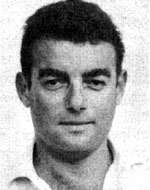Evyatar Yaakov (“Yankele”)
Son of Zeev and Hinda. He was born on Wednesday, June 8, 1932, in a small town near Rovno, Poland (now – Ocarina, in the Soviet Council), and his parents immigrated to Israel with him when he was eight months old. Growing up in Tel Aviv. He completed his elementary studies at the Carmel School and then studied for one year at the municipal high school. However, he completed his high school studies at Maoz Haim, where he moved with the youth group to which he belonged. Was a devoted son to his parents and yet did not give in to their requests to continue his studies. Soon he called the labor life in the agriculture and at the end of the War of Independence, Yaakov gave his share in guarding and working in the branch of the Shlachin. In 1950 he was drafted into the IDF together with all the members of the first class of the school in Maoz, and after completing basic training he went straight to the officers’ course and in 1952 he completed his service as a lieutenant and returned to his home in Maoz, where he joined the kibbutz secretariat. Young women from the old farms to help the young farms, Jacob joined his girlfriend to come to the aid of the Netiv-Halevy farm; Where their firstborn son was born. Two years later, the family returned to Maoz Haim and Yaakov was sent to a course for farm centers at the Ruppin agricultural school. Then he played the role of concentrating labor in the agriculture. When it became apparent that the teaching staff was lacking in the school, Yaakov accepted the teaching and teaching functions of the ninth grade. Without prior training. At the same time, he became the center of the children’s company there. He did his work with great success, for each child was a world unto himself. In 1966 he went to Kibbutz Oranim to train himself to teach, but he did not complete this training. He was full of life and loved singing. In May 1950, as noted, he was drafted into the IDF for the first time and since then his ties with the IDF have been tight. In 1963 he moved to the commando unit and was appointed commander of the unit. That year he was promoted to Major. The summonses for reserve duty often came and as a commander he took his job seriously. At the same time, he did not assume any privileges even though he was inclined toward the atmosphere of membership relations in the unit. In his last year, the unit grew stronger and increased tension before the Six-Day War. It was almost a week since he was called from Oranim to come to the base for meetings, meetings and briefings. In the war he was preparing to be among the immigrants to the north, to the Golan, from which the evil had begun. But suddenly he was called south and there he fell in a battle that took place in the Dotan Valley in Samaria on the second day of the battles, on the 27th of Iyar 5727 (June 6, 1967), while he was removing soldiers from enemy fire. left a wife and two sons; The wife was pregnant and the daughter was born five months after her father sank. He was buried in the military cemetery in Nahariya and was later transferred to eternal rest in the cemetery at Kibbutz Maoz Haim. Jacob was commended for “displaying courage, resourcefulness and exemplary leadership on the battlefield.” The last act of battle was described: On June 6, 1967, when he commanded a reconnaissance company and tanks, he stormed into the city of Jenin, and after destroying enemy tanks, machine guns and anti-tank weapons, he took control of the police. A brigade force, which entered an ambush of twenty or so pits, burst into its half-track in front of tanks that fired extremely strong, in order to rescue the injured force. But during the rescue of this force fell from the enemy tanks. A book appeared in his memory. A pamphlet was also published in his memory by the departments in Maoz Haim. Hakibbutz Hameuchad’s booklet “Who Fell in the War” was mentioned. During an investigation in 2017 it was reported that he had received a Citation from the brigade commander.
